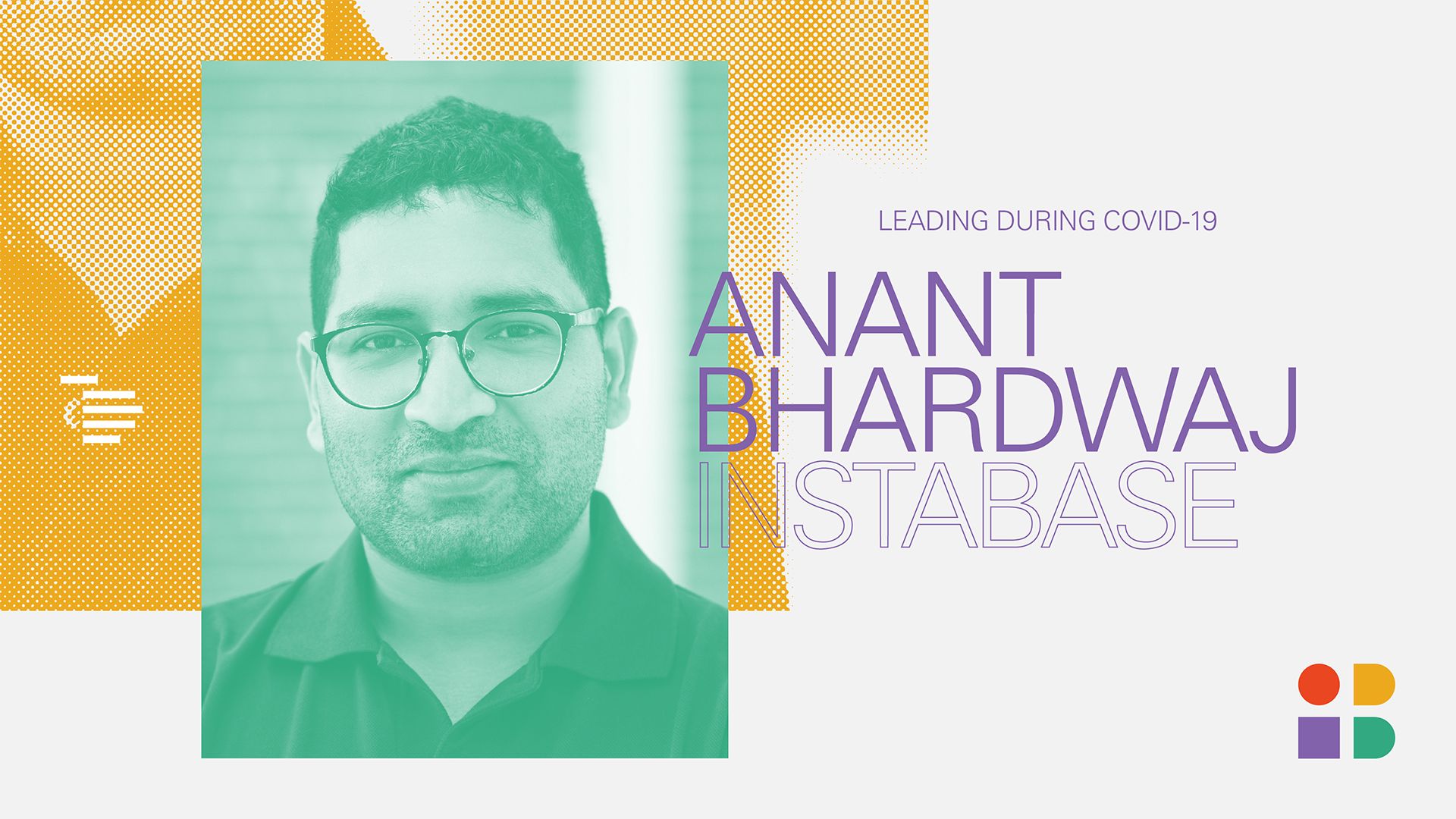Processing PPP Loan Applications at Scale: Instabase’s Anant Bhardwaj on Leading During COVID-19

Instabase has spent five years building out its vision to become the operating system for business apps. But its engineering team was tested to the max during the Covid-19 pandemic when banking customers urgently requested an app that could automatically process hundreds of thousands of applications for emergency federal loans. Instabase’s founder and CEO Anant Bhardwaj tells Index how their stellar engineering team turned a daunting technical challenge into a massive win.
About this series: As we navigate the evolving landscape of the world today, it's been powerful to see many organizations taking on new initiatives to engage with their employees, customers, and communities.
We spoke with leaders at our portfolio companies about the meaningful actions they’ve taken to continue moving forward through the COVID-19 pandemic. We hope the insights, advice, and best practices they’ve shared might be helpful to others going through similar challenges.
Can you tell us a bit about Instabase and the mission you started with.
Anant: Instabase is an operating system for business productivity applications. You can think about computing apps in three main categories: lifestyle apps, like maps, search, camera, Uber, Facebook etc; productivity apps, like word processing or spreadsheets, Slack and Zoom; and then operational apps for business, like retail banking, stock trading or taxes.
Lifestyle and productivity apps are well served by current operating systems both on desktop and mobile. But for operational apps there is no operating system. There’s no app store for a bank to buy a finance app, or for an insurance firm to find an app that will process claims, so these are often built by each company in a very custom way. Instabase provides an operating system for this sector where we can build and distribute apps for our customers.
We started Instabase to fundamentally change how people discover business applications, and that enables organizations to solve important problems they couldn’t solve before.
How has Instabase been coping with the implications of Covid-19, and how has it changed your company priorities?
Anant: It’s very important that we make sure all our employees are healthy and safe, that they feel connected to each other, and that we’re able to continue to work productively when everyone is remote. That has had its own challenges, but we’ve tried to host a number of meetings so that everybody still feels part of the team and feels they're connected. We have game nights, guest speakers and yoga sessions too.
On the business side, one of our top values at Instabase is customer obsession. Many of our customers are large global institutions, and they haven’t been designed to use services remotely. So we’ve been working with our customers to find out how to serve them in the best way possible, and Covid-19 has created different problems for different companies. PPP (Paycheck Protection Program) is one example of that; our banking customers' priorities changed quickly, so we worked with their teams to make sure they could process PPP loan applications quickly.
Tell us more about how you supported banks so they could deliver those loans.
Anant: During Covid-19, the federal government started to offer the Paycheck Protection Program so that small businesses could apply for loans. It started so suddenly that most banks weren’t in the position to be able to support it. But Instabase was able to quickly build an app we called PPP, and this allowed banks to process hundreds of thousands of loans per day.
These sorts of loan applications are very human-intensive to process — someone has to go in and look at the documents, and verify that all the data is correct. The data is very unstructured, and can be in PDF form or a scan, or images of pay stubs. And that’s all very hard to process. There were so many applications that if it was all left to humans they’d need thousands of people. It would be impossible. But it’s a problem Instabase was able to solve, and we provided the technology that could understand these complex documents. Our technology can do the entire process end-to-end in seconds, and make a decision in a fraction of a second.
We were able to rally the team to get that all done within four or five days. It was scary, and there were uncertainties and anxiety, especially because we were making promises to one of the top five banks in the US. That would have been a pretty high-profile failure. But people at Instabase take pride in dealing with these kinds of challenges and they rose to the occasion. It required many all-nighters, with people working round the clock for seven days so we could deliver the first version of the product to one of our customers and verify that it worked end to end.
I've said many times that we have one of the best engineering teams in the world, and whenever these kinds of challenges come, they take this as an opportunity to shine.
Can you describe the benefits for end users? Small businesses applying for these loans have had to wait a very long time, and it’s really impacted their survival.
Anant: Normally when you apply for a home or retail loan, make an insurance claim, or apply for immigration or taxes, it takes months because the paperwork has to go through a processing center where someone has to look through it all and verify it.
That will fundamentally change now that we have technology that can process all these things in a few seconds. Every organization from healthcare to banking and insurance will have the ability to respond to their customers more quickly than ever before.
What’s the secret sauce behind the technology that’s accelerating these processes?
Anant: Instabase has done two significant things. Firstly, we developed a breakthrough in interpreting and understanding documents. We’ve built a set of complex primitives to read, extract and classify information from a spectrum of documents. Secondly, our platform makes it really easy for developers to combine multiple applications together to build an end-to-end solution. This includes applying business logic, adding human review, and integrating data into downstream systems. Instabase’s platform consists of state-of-the-art tools to help solve problems in those areas to accelerate customer processes.
Why did you decide to give the PPP app away for free?
Anant: We decided to make the PPP application free to any organization, regardless of their size, or regardless of whether they are for profit or nonprofit, because we saw the struggle of some of our customers firsthand. Some of our customers are America’s top banks, so we knew if they were struggling to cope with demand that every other company would be having those problems too. Ultimately, we wanted to make sure that small businesses could get a response on their loan applications as soon as possible because that could determine whether they survive or not.
If you look at the distribution of those loans, a huge volume has gone to some top banking providers in the United States. It’s hard to give an exact number but we have been able to process a significant amount of that volume through our customers. We’re processing hundreds of thousands of transactions per day.
What have you learned about leadership during this time?
Anant: That the focus needs to be on people. That they need to feel safe and engaged so that they can be productive. You never know what problems they are dealing with, and I felt like I could have been better prepared by thinking about all this ahead of time. So that’s lesson number one. When you can’t meet everybody you need to communicate even more regularly to keep everybody on the same page about company strategy, especially when there’s a degree of uncertainty and anxiety because of layoffs in the industry. You need to give your people confidence, and you do that by doing everything possible to make them feel safe.
The second leadership lesson has been that customers need more help during this time too, because they rely on us to serve their own customers. Like with the PPP problem, they came to us asking if we could solve this in a week. And while that’s scary, it’s also an opportunity to rally, focus on a problem, and prove you can really deliver.
Can you give an example of how one of your customers is using Instabase?
Anant: Standard Chartered is using Instabase across a number of different markets for KYC (Know Your Customer), loan processing, and for a number of different operational use cases. That's the case for many other top financial institutions in the US as well.
What have been your biggest surprises during lockdown, and the biggest lessons you’ve learned?
Anant: Some of the biggest institutions across the globe have struggled during this pandemic, partly because of their reliance on having their people in offices. One of the biggest surprises was that they were so unprepared. There will be some big changes after this, and most organizations will be better prepared to handle this kind of situation. Another lesson is that even though we have video conferencing and all the other communications technologies, it's just hard to have the same degree of communication as you do when everybody is in the office. We had to adapt and figure out new ways to keep employees motivated and give them all the right processes and procedures.
If you fast forward five to 10 years from now, how will Instabase play a role in accelerating businesses’ ability to be more efficient and customer friendly?
Anant: Right now, building a new business is hard because you have to start from scratch. But five years down the line, everything could just become an app, so anybody should be able to take these components and build their own business on top of it. Immigration processing could be an app, tax processing could be an app, retail lending could be an app, and savings banks could be an app. The way there’s an app store today for lifestyle and productivity applications, there will be an app store for all the business applications one can imagine, and we’d be able to buy and sell the apps and build new businesses on top of them.
Published — Sept. 17, 2020
-

-

